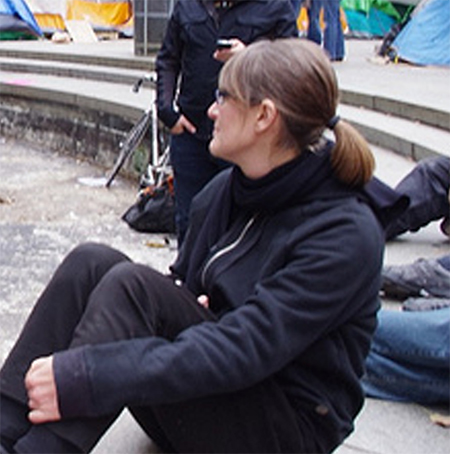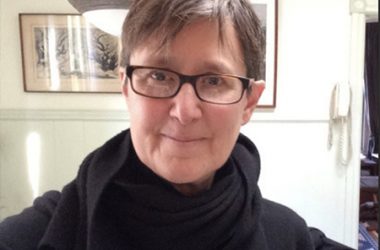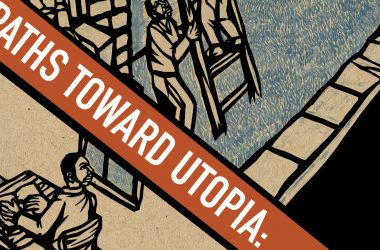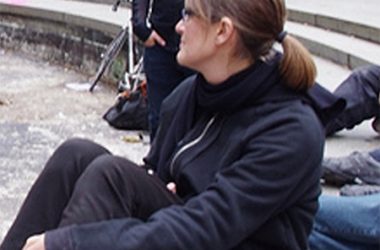
I woke this morning, May 10, in the same homey hospice room as my mom, one of my sisters, and my dad. We’d done a slumber party of sorts on two hospital beds and one foldout couch, facing a wall of windows that open out to birds and flowers of all colors. On this misty-rainy morning, the new-green grass surrounding a pond of orange koi appeared extra brilliant, framed by the branches of what’s become my new favorite tree, the Redbud. The day before, May 9, was the day my dad was supposed to die. But he didn’t.
After nearly four hours of an amazing hospice nurse slowly sedating him into a peaceful, deep sleep, then turning off the ugly noise of his ventilator equipment — machinery meant to tide people through short-term medical situations, but that’s now turning into the cruel, dehumanizing technology of a new “growth industry” — rather than lasting a few minutes, my father decided to breath on his own. It’s not enough breathe to sustain him. Yet it’s plenty to allow him to stay in this peaceful, deep sleep as his body follows its own natural course of winding down. It’s enough for him to do what I’ve wanted for him since the start of his West Nile Virus hell almost nine months ago: die on his own terms, with dignity. And it’s providing plenty of breathing space for us to process this experience with him, within this commons of death that, more and more, I’m understanding hospice supplies in abundance.
I’m about to sleep next to my dad, on a sort of wheelchair-like recliner, with his breathing starting to slow down and the gaps in between his breathing stretching out a bit wider, as we move into May 11. Another sister has joined us in this shared space on this second night of extra life that my dad seems determined to share with us. I can hear peepers outside. Last night, when my mom and sister and I were outside at one point, on this 22-acre hospice nestled at the bottom of an old quarry, some twenty deer converged on our left and right; we became the “deer in the headlights,” transfixed by the magic of these quiet creatures seemingly come to join us in this communal send-off.
There’s so much more that could be written about this anachronistic, anarchistic experience of hospice — a gift that’s being bestowed on my whole family, if that makes any sense to those who haven’t gone through death as it used to be, and in some places still is. Those reflections will have to wait, I suspect, for a time when my dad’s breath stops for good. But I will say this for now. If you’d asked me two days ago about whether I’d want to camp out in a room with my two parents and two of my sisters — sharing food, laughter, birdwatching, tons of visitors, memories, talking to my dad while he sleeps so deeply, and the constant transformations taking place on his body (dignified now by a good-looking shirt, fresh-clipped toenails, and the lack of life-support tubes, and covered in cozy quilts) as he dies in his own good time, in a good way — I’d have said no. This afternoon, while walking through the sublime palette of this hospice landscape outside my dad’s room, the word “deathwatch” sprang to my mind, now not simply as a word, but instead as heavy with lived meaning, as lost art, as necessary practice. We are here together, listening to his breath tick away the remaining days, hours, and at some point soon, seconds of his life, watching over him and watching over each other. The hospice folks (who now feel almost like friends and certainly like empathetic participants in this deathwatch) keep telling us that the last thing that goes is the hearing. My dad seems to be “watching” us through listening, responding in minute ways to our conversations with him and each other. All those breathes he’d “saved up” while on that accursed ventilator that was breathing for him are now being given back to him, to us, so that we can do the work as a community — transparently, in this hospice neighborhood — of easing ourselves into what’s ahead.
Like barn raisings and town meetings, also being lost to time, we need more places and spaces for deathwatches. This evening, in the wee hours of May 11, my place and space is a room I’m sharing with an eccentric bunch of characters (myself included) who I love, faults and failings included.
* * *
If you’ve run across this blog post as a reposting somewhere, you can find other blog-musings and more polished essays at Outside the Circle, cbmilstein.wordpress.com. Share, enjoy, and repost — as long as it’s free as in “free beer” and “freedom.”
(Photo by Cindy Milstein, Stoneleigh Hospice, Lansing, Michigan, 2013)




